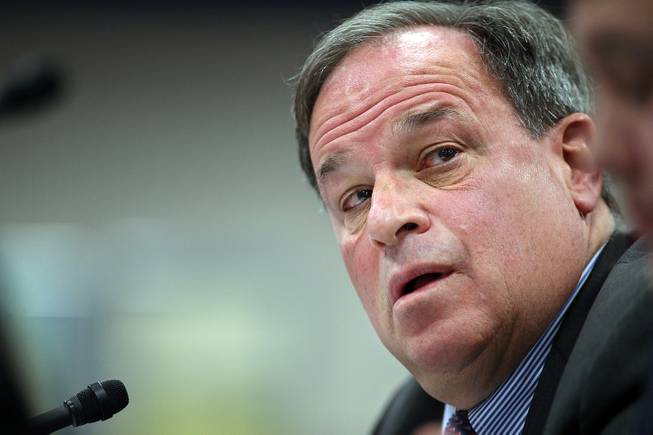
Cathleen Allison / AP
Nevada Treasurer Dan Schwartz testifies in committee at the Legislative Building in Carson City on Thursday, Feb. 12, 2015.
Published Tuesday, Feb. 21, 2017 | 10:58 a.m.
Updated Tuesday, Feb. 21, 2017 | 3:30 p.m.
A hearing Tuesday to examine a proposed Educational Savings Account budget became a debate about the viability of ESAs and an examination of Nevada State Treasurer Dan Schwartz’s management of the program since its creation during the last Legislature.
Schwartz presented his budget for the ESA program and for others his office administers before the Assembly Ways and Means Committee. In addition to the ESA budget, the committee was supposed to examine five other programs Schwartz’s office administers.
However, the meeting never got beyond ESAs and the treasurer’s office’s budget. The time was spent with testimony and committee members questioning Schwartz about why he spent funds on the ESA program when it faced serious legal challenges soon after its creation in 2015.
In his opening remarks, Schwartz defended ESAs as a way to help parents find alternatives to a failing school system.
“I would ask the many wonderful teachers and educators we have in Nevada to look deep in hearts and ask, ‘Why is a school system I have taught and worked in dead last in our nation and isn’t time for a change?’ ” Schwartz said.
Schwartz was joined in his support of ESAs and questioning of the public school system’s achievements by at least half a dozen parents who spoke about how ESAs could help them better educate their children.
One Spanish-speaking mother — testifying through a translator — talked about how she came to the United States for better opportunities but did not have the resources to help her son attend a better school. “I would appreciate it if you could support this program to give my son the support he deserves,” she said.
Critics of ESAs at the meeting, including representatives from the Nevada State Education Association and groups representing current and retired teachers and school administrators, testified that ESAs mostly benefit private schools and the rich.
Private schools can discriminate against minorities and don’t have to accept students with disabilities or learning issues, they said. Also, they added, allowing parents to choose alternatives to public education could hurt other students.
Brian Rippet, a single father of four and vice president of the Nevada State Education Association, said allowing parents to leave the public school system could hurt the students who remain, especially in smaller school districts.
Rippet, whose children attend a small school in Zephyr Cove on the shore of Lake Tahoe, said his children could miss out on certain classes if not enough students are enrolled.
“If one student or one family decides “I’m choosing to go somewhere else, you know “I’m choosing to home-school,” Rippet said. “We fall below that threshold of six students, and my son is shut out of maybe AP chemistry, maybe physics.”
The committee also questioned Schwartz over why his department hired a public information officer (PIO) to handle the ESA rollout and why it was spending funds on ESAs after a court injunction halted the program and the Nevada Supreme Court ruled its initial funding was unconstitutional.
“What I’ve heard several times is that the PIO is just for this — the establishment of the ESA program — and the ESA program has been put on hold because of the court decisions made,” Assemblyman Michael C. Sprinkle, D-Sparks, said. “So I wonder what the PIO is doing now and what will he do in future while it’s uncertain if the ESA program will continue to exist.”
“I would disagree,” Schwartz said. “The funding of the ESA program has been put on hold. But the program itself is alive and well. It is not unconstitutional. It is not over. The Legislature and the governor will decide what form it takes. But it is very much alive.”
This is the third time representatives from the treasurer’s office have been queried about ESAs. The first was on Feb. 9, when the Senate Finance Committee examined the treasurer’s budget.
On Feb. 17, the Assembly Committee on Ways and Means and Senate Committee on Finance met to examine other aspects of the treasurer’s budget. But committee members questioned Grant Hewitt, Schwartz’s chief of staff, primarily about ESA issues, including what educational expenses would be covered by ESA funds.
Each government department must go before Assembly and Senate committees to present its budget for the next two fiscal years.
In addition to ESAs, this committee meeting was supposed to have examined the following accounts administered by the Nevada State Treasurer’s Office:
• Account 1080, State Treasurer (the budget for running the office itself)
• Account 1092, Nevada College Savings Trust
• Account 1094, Endowment Account
• Account 1088, Millennium Scholarship Administration
• Account 3815, Unclaimed Property

Join the Discussion:
Check this out for a full explanation of our conversion to the LiveFyre commenting system and instructions on how to sign up for an account.
Full comments policy